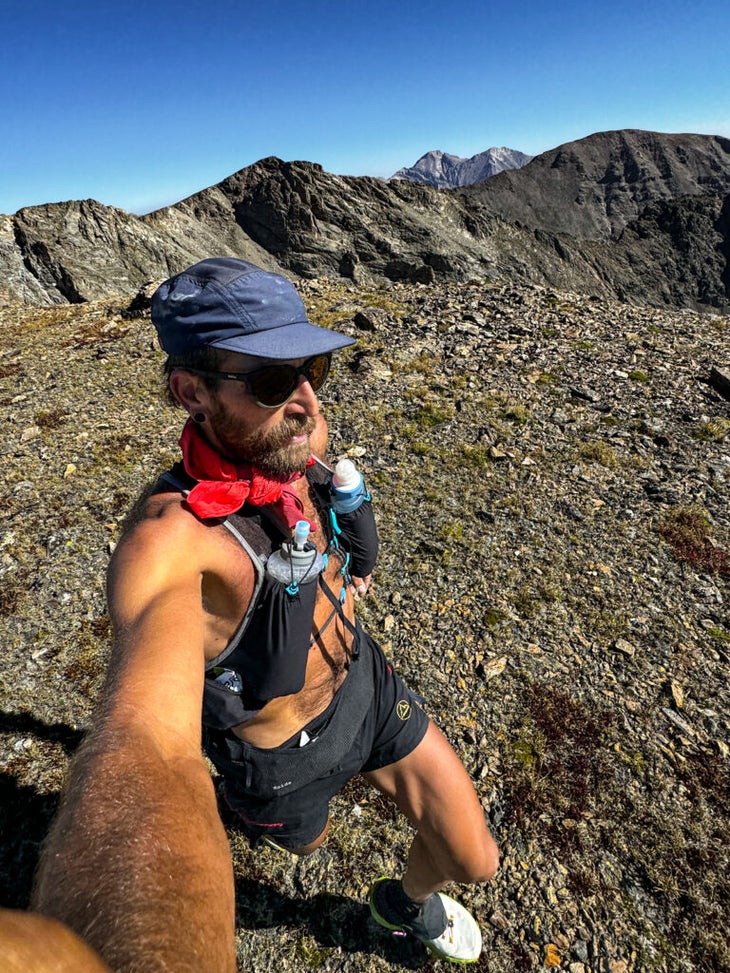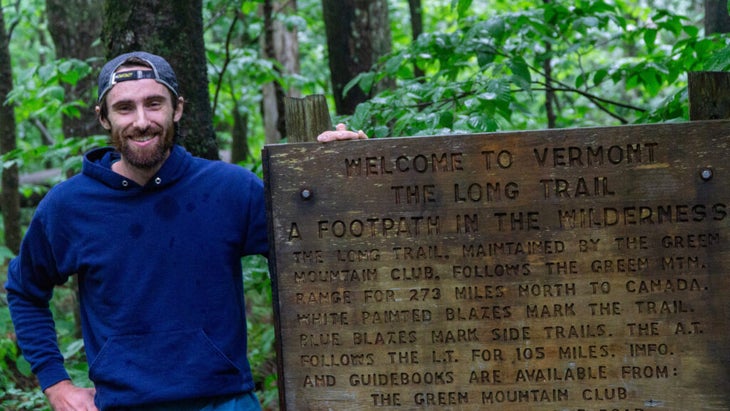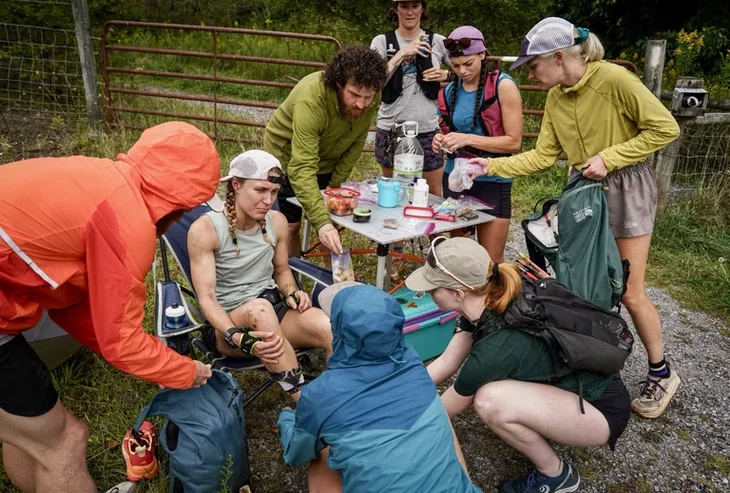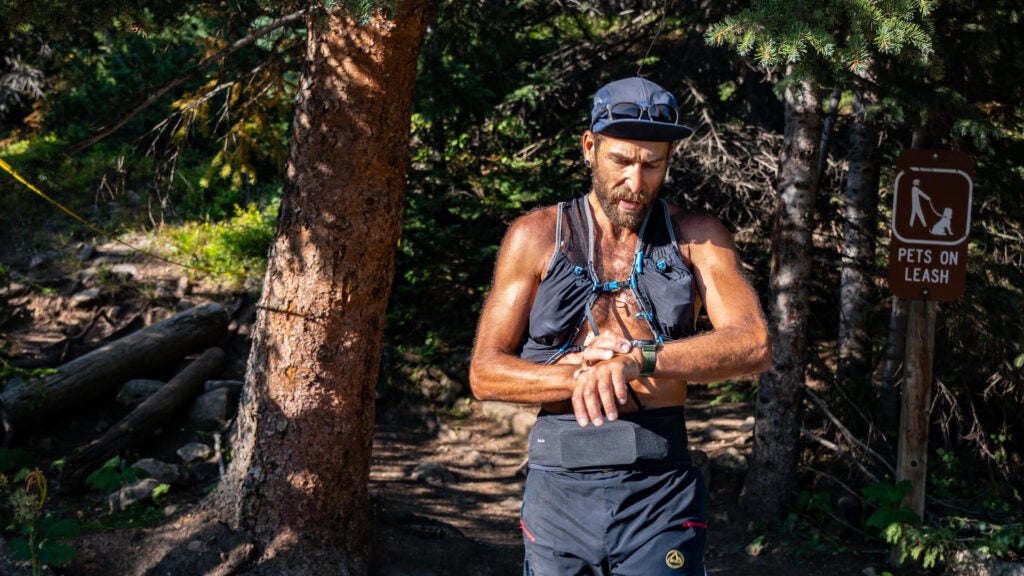“], “filter”: { “nextExceptions”: “img, blockquote, div”, “nextContainsExceptions”: “img, blockquote, a.btn, a.o-button”} }”>
New perk: Easily find new routes and hidden gems, upcoming running events, and more near you. Your weekly Local Running Newsletter has everything you need to lace up!
>”,”name”:”in-content-cta”,”type”:”link”}}”>Subscribe today.
There’s something about late summer. The last of the snow melts, the summer rains stop, and the air finally begins to cool. In short: it’s the perfect weather for a long run. Or—if you happen to be a top-tier endurance athlete—for smashing your heroes’ records to smithereens.
Over the last few weeks, trails across the United States have seen some stunning new Fastest Known Times (FKTs). What’s more, they’ve been rolling out at a pace that’s left our news team scrambling to cover them all. From an astonishing controversial three-hours sprint up the Grand Teton, to a grueling 40-day, 18-hour Appalachian Trail sufferfest, it’s been a fast, fast summer.
The season’s perfect weather—cool, dry, mercilessly free of wildfire smoke in many regions—has helped bolster the rate of new records. But a big part of the uptick may actually be post-pandemic timing.
“There was a big push toward FKTs during Covid,” said Will Peterson, who set a new FKT on Vermont’s 272-mile Long Trail FKT on September 1. “Some people went back to doing races, but many athletes have stuck around because they got into FKTs during the pandemic and really liked it.”
According to Peterson, FKTs have become more respected over the past few years—which has made them a target for big-name celebrity runners as well as speedy underdogs who would normally eschew traditional competitions.
“In some ways, it’s more accessible and more relatable than running races,” Peterson said. “That’s why I got into it—it’s something anyone can do. You don’t have to have a ton of money or sponsorships to go out and set an FKT.”
Today, more people seem to be chasing long-trail records than ever before, Peterson said. Between the increased awareness and expanded pool of contenders—many of whom have now been training for exactly this sort of objective for several years—it’s perhaps no wonder that record-setting is entering a golden age. Here’s a look at five perfect case studies from this summer.
Brent Herring Fought Hallucinations to Score a Colorado Trail FKT
On August 22, Durango, Colorado-based endurance athlete and skimo racer Brent Herring kicked off FKT season when he stumbled across the finish line of the 500-mile Colorado Trail with a new self-supported record. His time—10 days, 17 hours, and 38 minutes—was about four days faster than the women’s record, which Marilyne Marchand-Gouin set in 2020.
While popular, the Colorado Trail is no walk in the park. Many hikers need four to six weeks. After all, the distance is only part of the challenge. Much of the route lies above 10,000 feet, and numerous grueling climbs and mountain passes rack up around 90,000 feet in total vertical gain. On his very first day on the trail, Herring suffered from heat exhaustion and nearly quit. A week later, he started hallucinating and hearing voices, another symptom of extreme fatigue. But he pushed through to the finish, cruising into his hometown just after midnight where his wife—and a large pizza—were waiting.

Anton Krupicka Ran the LA Freeway in Just Over 13 Hours
On August 31, ultrarunner Anton Krupicka practically sprinted the LA Freeway, a 34-mile traverse of the Continental Divide, which he took down from then just 22-year-old Kyle Richardson‘s 2018 mark to just over 13 hours. The route is as technical as it is long: It includes considerable stretches of fourth- and fifth-class terrain and connects the highest points of Colorado’s Indian Peaks Wilderness and Rocky Mountain National Park. The entirety of the traverse lies above 12,000 feet in elevation.
To prep, Krupicka spent as much time at altitude as possible. “I climbed Longs Peak 30 times over the course of the summer,” he said. “But to be honest, I didn’t think I was going to set the record this year.” He’d initially planned for a July attempt, but by then, the ephemeral streams lacing Colorado’s highcountry he would rely on for hydration had all but dried up. Krupicka knew the unsupported record would be impossible without on-route water.
“I’d pretty much given up,” he said. But a last-ditch reconnaissance mission in August revealed reemerging springs after a few weeks of heavy rain. Krupicka immediately started prepping for a record attempt. On August 31, he went for it—and finished the route in a cool 13 hours, 20 minutes, and 48 seconds.

Will Peterson Broke the Long Trail’s Four-Day Barrier
Over Labor Day weekend, Will Peterson scored the overall FKT on America’s oldest thru-hike: the 272-mile Long Trail in Vermont. He completed the route in just three days, 21 hours, and ten minutes. In doing so, he became the first person to finish the trail in under four days, and beat the previous record by more than six hours. The feat comes about a year after Peterson set the trail’s unsupported record in August of 2023.
For Peterson, the early-September timing was purely related to the Labor-day school break he had: as a third-year medical school student, weekends and holidays are pretty much the only time he has to bust out big multi-day adventures. During the week, he works or studies for eight to ten hours per day, and spends the rest of the time training.
To notch the record, Peterson averaged around 70 miles and up to 22,700 feet of elevation gain per day (which is a lot, even by ultrarunning standards) and relied on a team of 30 pacers and crew members—only about half of whom he knew.
“I put out an appeal to the local running community, saying that I needed help with a supported attempt,” he explained. “About half the people who responded were friends and family members. The rest were total strangers.” But together, they helped him battle debilitating quad pain, long stretches of night running, and total exhaustion to crush his previous record by about 15 hours.
“It was truly a team effort,” he said.
Michelino Senseri Attempted a Controversial FKT on the Grand Teton
On September 2, Idaho-based endurance athlete Michelino Senseri announced that he’d bagged a sub-three-hour speed record on Wyoming’s Grand Teton. In the following days, Fastest Known Time reviewed his claim—and then rejected it.
In their review of his claim, Fastest Known Time noted that Sunseri cut at least one switchback. That means that, while he did climb the Grand in a very fast time, he did not follow the sanctioned route. Because he was essentially competing on a different field of play, his claim was ruled invalid.
His feat is still impressive. It takes most experienced climbers a full day to summit and descend the 13,770-foot peak. The fact that Sunseri was able to do it in just 2 hours, 50 minutes, and 50 seconds speaks to his athleticism and dedicated preparation: he completed more than 40 climbs of the Grand over the course of several years before making his effort. But a few decision-making errors cost him the ultimate triumph.

Tara Dower became the Appalachian Trail’s New Speed Queen
On September 21, just a few minutes to midnight, Virginia-based thru-hiker and endurance athlete Tara “Candy Mama” Dower jogged the final hill to the top of Springer Mountain, the southern terminus of the Appalachian Trail. When the clock stopped at 40 days, 18 hours, and 5 minutes, she became the fastest human—woman or man—to complete the Appalachian Trail supported.
Dower ran an average of 54 miles per day to snatch the record from previous FKT-holder Karl Sabbe. She also ate upwards of 10,000 calories each day and woke up at 3:00 AM every morning to stay on pace. It paid off. In a recent Instagram post, Dower called the feat “a dream come true.”
“If I’m to be honest I didn’t think it was possible,” she wrote. “However, I had people on my crew who believed in my abilities and pushed me to my limits. That’s all it was.”
